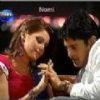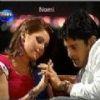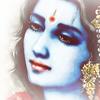When Arjuna has vowed to slay Jayadratha the next day, his servants show him naityakaṃ naiśaṃ Traiyambakaṃ balim - the usual nightly offering to Tryambaka - at Droṇaparvan 56.3. Arjuna adorns Kṛṣṇa (who has been decorating Arjuna's bed) with perfumes and garlands and tells him about the offering. Kṛṣṇa tells him, supyatāṃ Pārtha bhadraṃ te kalyāṇāya vrajāmy aham - sleep, Pṛthā's son, luck to you, it's better that I go.
Shortly thereafter, they are both still awake, worrying about how to fulfil the vow. Kṛṣṇa remarks (Droṇaparvan 57.16-18):
Pārtha Pāśupataṃ nāma param'āstraṃ sanātanam
yena sarvān mṛdhe Daityāñ jaghne devo Maheśvaraḥ
yadi tad viditaṃ te'dya śvo hantā'si Jayadratham
atha jñātuṃ prapadyasva manasā Vṛṣabha-dhvajam
taṃ devaṃ manasā dhyāyañ joṣam āssva Dhanaṃjaya
tatas tasya prasādāt tvaṃ bhaktaḥ prāpsyasi tan mahat
Pṛthā's son, the one called Pāśupata - of the Beast-Lord - is the supreme missile forever, with which God Maheśvara slew all Diti's sons in battle. If you know it now, tomorrow you're the slayer of Jayadratha, or to know it, mentally approach Vṛṣabhadhvaja - him of the bull flag. Mentally focussed on that God, sit quietly, Dhanaṃjaya - property-victor! Then by his favour, you as the devotee will obtain that great thing.
As if he hasn't already obtained Pāśupata from the Kirāta episode - which would have been discussed with Kṛṣṇa during preparations for war, Dhanaṃjaya promptly applies water and sits down on the ground, singularly focussed, mentally approaching Bhava.
At the time of Brāhma muhūrta, Arjuna beholds himself in the sky, his right arm gripped by Keśava, flying with wind-speed among luminaries and superhumans, northward to Śvetaparvata (Himavat or Kailāsa). He views Kubera's lotus-pond, Gaṅgā, Mandara's localities, the Kāla mountain and Himavat's foothill Maṇimat, Brahmatuṅga, Suśṛṅga, Śataśṛṅga, Śaryāti's forest, the place of the Horse-Head (Fire) and the place of Ātharvaṇa, the Vṛṣadaṃśa mountain and Great Mandara. Moving like a shot arrow, he reaches a flaming bright mountain atop which effulgent, fair-skinned Vṛṣabhadhvaja sits in perpetual tapas, with trident, bow-and-arrow, matted hair, and thousands of eyes on his limbs, wearing bark and hides, accompanied by the mountain's daughter, sages, and hordes of spirits.
Vāsudeva - Vasudeva's son - and Pārtha - Pṛthā's son - both touch their heads to the ground and repeatedly praise Śarva, who offers to grant whatever they want. They praise him with a ten-śloka prayer and Arjuna sees his usual nightly offering next to Tryambaka. Arjuna asks for the divine astra, and Vṛṣāṅka - he of the bull-mark - sends them to fetch his bow and arrow from a nearby lake of ambrosia. Within the lake, they see a horrific serpent and another serpent with a thousand heads spitting flames. Praying with the brahma śataRudriya hymn, Arjuna and Acyuta cause the serpents to transform into a bow and arrow, which they bring to Vṛṣāṅka. A blue-and-red brahmacārī with tawny eyes demonstrates the bow and arrow, and the Pāṇḍava studies his bowstring, grip, and the mantra - secret - expounded by Bhava. Arjuna returns the arrow and bow to the lake.
At this point (Droṇaparvan 57.78-79), just before Arjuna and Keśava bow their heads again and return in an instant to the battle camp, an allusion to the Kirāta episode occurs, and Śiva grants Pāśupata to Arjuna as if he hasn't just taught it to him:
tataḥ prītaṃ Bhavaṃ jñātvā smṛtimān Arjunas tadā
varam āraṇyakaṃ dattaṃ darśanaṃ Śaṃkarasya ca
manasā cintayām āsa tan me saṃpadyatām iti
tasya tan matam ājñāya prītaḥ prādād varaṃ Bhavaḥ
tac ca Pāśupataṃ ghoraṃ pratijñāyāś ca pāraṇam
Then, knowing Bhava to be pleased, Arjuna at that time remembered the wish granted in the forest exile and the vision of Śaṃkara, and he mentally wished, "May that be available to me." Discerning that thought of his, Bhava was pleased and granted his wish: that horrific Pāśupata and the fulfilment of the vow.
Speculatively, one could read these verses 57.78-79 right after 57.19, where Arjuna sits down to pray after hearing Kṛṣṇa's advice in 57.16-18 that he needs Pāśupata. The whole adventure of flying north, finding the offering next to Śiva, and learning Pāśupata with the bow and arrow from the lake may have been inserted later. Originally, an author wanted to impress upon the audience that Arjuna could confidently vow to slay Jayadratha because Arjuna possessed Pāśupata ever since the famous Kirāta adventure (which is referenced at several other places in Mahābhārata). This author dramatized the point by making Kṛṣṇa question whether Arjuna possessed Pāśupata, and so Arjuna prayed to ensure Paśupati's blessing, experienced the earlier divine darśana anew, and felt confident of success.
When a later author came up with the flying adventure for Arjuna to obtain Pāśupata, it might have replaced verses 57.78-79, so that there was no allusion to the earlier darśana of Kirāta. Later still, someone with access to both versions of Arjuna's nightly preparation would have synthesized them into what we have today: Arjuna has just obtained Pāśupata when he remembers that he obtained it before!
I should note that Arjuna doesn't actually use Pāśupata in the events of the fourteenth day that culminate with him slaying Jayadratha. It's only after the war that Arjuna uses Brahmaśiras - a synonym of Pāśupata (see my post above) - against Aśvatthāman.
While the consensus is that Pāśupata is such a special weapon that even Gods like Indra, Yama, Kubera, Varuṇa, and Vāyu don't possess it, let alone mortals (Āraṇyakaparvan 41.14), there is one place where Pāśupata is just another missile that Droṇa's bow shoots at Arjuna (Droṇaparvan 163.28):
Aindraṃ Pāśupataṃ Tvāṣṭraṃ Vāyavyam atha Vāruṇam
muktaṃ muktaṃ Droṇa-cāpāt taj jaghāna Dhanaṃjayaḥ















comment:
p_commentcount